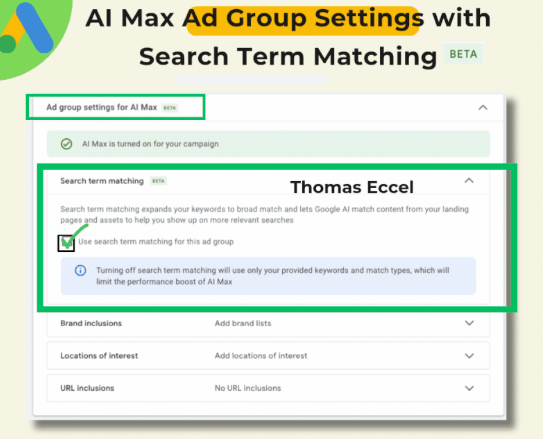A new beta spotted in Google Ads, dubbed “Ad Group setting for AI Max,” is giving advertisers a preview of Google’s next major move – broadening search targeting at ad group level with less reliance on manual keywords and more on AI-driven intent signals.
How it works. When enabled, Search Term Matching transforms keyword targeting by auto-expanding all terms to Broad Match, allowing Google’s AI to analyze page content and creative assets to match with relevant queries.
- Advertisers can opt out by turning it off, reverting to strict match-type targeting without algorithmic expansion.

Why we care. This shift signals a deepening push toward automation in paid search. With the feature enabled by default, campaigns may gain broader reach, but also risk appearing for loosely relevant queries, making control and performance monitoring more critical.
Zoom out. This new setting builds on the AI Max beta first announced by Google in May, which was positioned as a fully automated campaign type designed to maximize performance using AI across bidding, creative, targeting, and placements.
The ad group-level controls now appearing in some accounts show how Google is testing modular rollouts of that system, potentially offering advertisers more flexibility within the broader AI Max framework.
Yes, but. While this beta grants reach, it introduces risk. Expanded targeting can surface ads for loosely related queries, testing the balance between discovery and precision. Google is offering four control levers at the ad group level to help advertisers manage this tradeoff:
- Search Term Matching.
- Brand Inclusions.
- Location of Interest.
- URL Inclusion.
What they’re saying. Thomas Eccel, head of Google Ads at JVM Impact, spotted this setting in Google Ads. He said the update isn’t just about convenience – it’s about nudging advertisers to trust AI’s judgment, reinforcing automation as the new normal in search strategy.
Bottom line. Google’s AI Max beta underscores a future where automation leads and keywords follow, if at all.
Search Engine Land is owned by Semrush. We remain committed to providing high-quality coverage of marketing topics. Unless otherwise noted, this page’s content was written by either an employee or a paid contractor of Semrush Inc.


